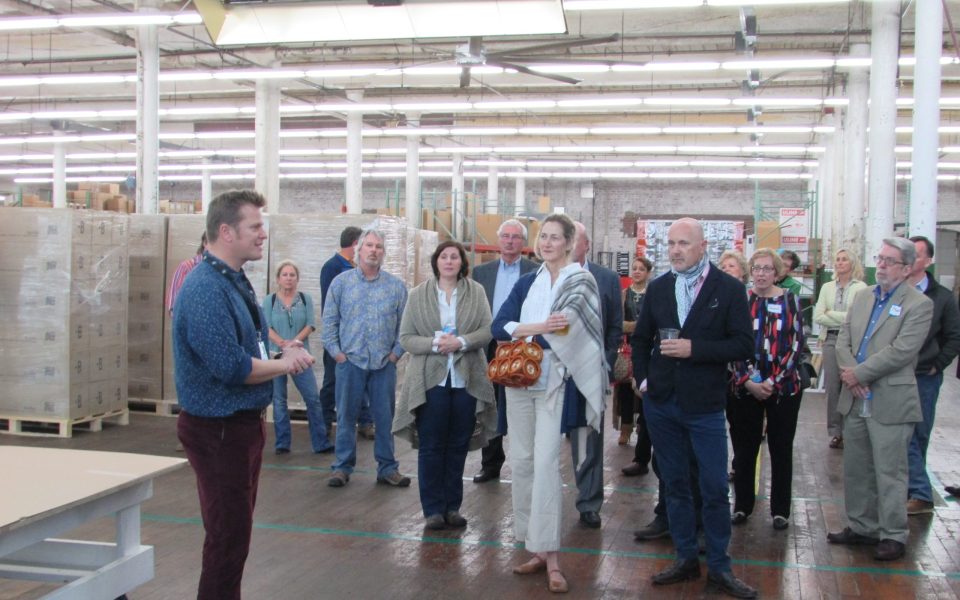Among the 90 or so manufacturers, designers, professional crafters and artists who poured onto the second floor of the cavernous BuzziSpace furniture factory on a recent Wednesday evening, there wasn’t a single red “Make America Great Again” hat to be seen and hardly a peep of overt political talk.
Manufacturer Gregg Arrington and entrepreneur Dave Springett, two men with 30 years of experience each in the industry, founded the NC Furniture Institute a year and a half ago with the intention of resurrecting a spirit of collaboration among their peers, networking, socializing, sharing knowledge and rebuilding the furniture industry in High Point and across the state.
“We feel like a lot of jobs and skills have been given away,” Springett said while greeting guests for the association’s monthly meeting, a tour of BuzziSpace with complimentary wine, meatballs and banana pudding. Springett acknowledged feeling “positive” about Donald Trump’s manufacturing agenda, but his talking points veered far away from federal trade policy and betrayed no hint of resentment.
“We have to help,” he said. “One of the things we have to do here is a furniture academy. We want young people to understand there’s a future in this. We need to combine forces to show people there’s a future in making things in this country. You can make $40,000 to $50,000 a year making things with your hands. That’s a whole lot more future in that than working in retail and fast food. The people in this room can’t find enough workers. They can’t afford to train their own workers. That’s where we can get GTCC involved.”
BuzziSpace, a 9-year-old Belgian company that specializes in comfortable seating and sound-dampening components for co-working spaces, seems like a natural place for Springett to make the argument, because the company provides a tangible advance on the promise held out by the institute for revitalizing the industry. BuzziSpace opened its US production facility in the old Pickett Cotton Mill in High Point’s historic industrial core in May 2014, with roughly 40 percent of its product for the US market produced by 38 employees in High Point.
The vibe of business, which provides workspace furniture for tech companies like Facebook and LinkedIn, is more enlightened collaboration than red-blooded pride and American exceptionalism; the company is Belgian, after all. Tom Van Dessel, the company’s cheerful and athletic CEO, showed off the company’s fleet of roadster bikes — purchased in anticipation of a future greenway — to his industry peers, and mentioned the raised beds surrounding the building that provide food for employees, noting that the factory is located in a food desert.
The company scouted locations in Michigan, Indiana and Tennessee, but ultimately chose High Point — a city he called “a diamond in the rough.”
“We could have gone to Grand Rapids, Michigan,” Van Dessel said. “But I said to myself: ‘I’m going to get lost. No one’s going to give us any attention.’ In High Point, we can stand out. This is a place where people are looking for a reversal.”
For Van Dessel, the privilege of accessing the American market is best paid back by employing American workers.
“I don’t need protection to make things here,” he said after the tour. “I’m more driven by the moral imperative: If this is the area and the country that’s generating revenue for my company, how do I best make the investment to continue that? The best way I can think to do that is to employ people locally and provide them with a livelihood.”
A trade war or steep tariffs on foreign goods probably wouldn’t provide positive reinforcement for his decision to invest in High Point.
“In my industry, I’m always going to have to import something,” Van Dessel said. “I seriously doubt if you can find a zipper made in the United States. For this business [protectionism is] not necessarily going to help.”
Less than three years in, BuzziSpace is already demonstrating the collaborative spirit that the NC Furniture Institute holds up as an organizing principle for the furniture industry. Faced with excess square footage, BuzziSpace invited one of its suppliers, Splash Works, to set up shop in the basement of the old mill. Proximity facilitates communication.
Along with producing printed fabric for BuzziSpace’s cut-and-sew operation, Splash Works is also replicating paintings by local artist Brian Davis and producing uniforms for college and high school baseball teams.
As the home to the largest furnishings industry trade show, High Point can feel like a colony that belongs to a floating population of international buyers and manufacturers, giving the city the air of a deserted camp all but two weeks out of the year.
“Product defines place,” Janet Kagan, an arts consultant, told the crowd gathered at BuzziSpace. Buying and selling is fine, but maybe High Point could once again be known for making things.
Join the First Amendment Society, a membership that goes directly to funding TCB‘s newsroom.
We believe that reporting can save the world.
The TCB First Amendment Society recognizes the vital role of a free, unfettered press with a bundling of local experiences designed to build community, and unique engagements with our newsroom that will help you understand, and shape, local journalism’s critical role in uplifting the people in our cities.
All revenue goes directly into the newsroom as reporters’ salaries and freelance commissions.


Leave a Reply